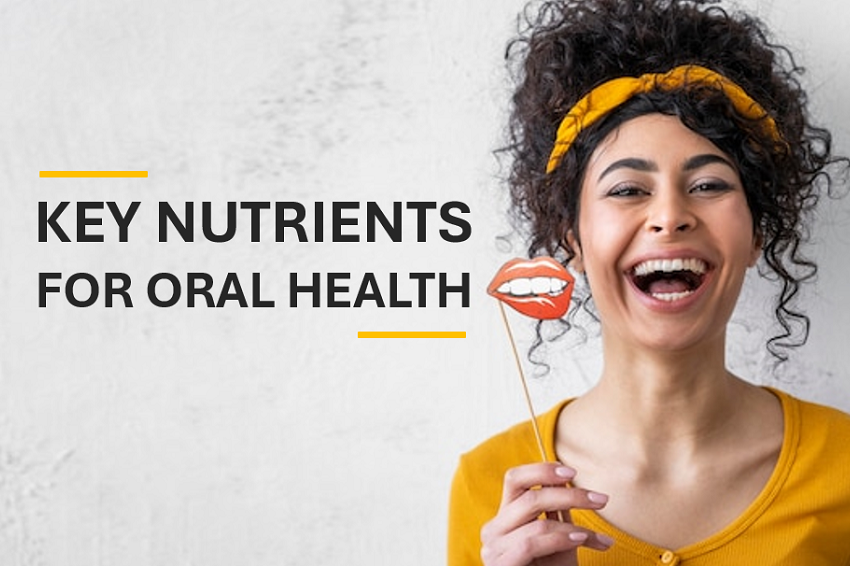Good oral health is not only about brushing and flossing regularly but also about what you eat. Proper nutrition plays a fundamental role in maintaining strong teeth and healthy gums. A diet rich in essential nutrients can help prevent dental issues such as cavities, gum disease, and tooth loss. Understanding the nutrients that contribute to oral health and incorporating them into your daily diet can make a significant difference in the overall health of your mouth. In this guide, we will explore five essential nutrients that are crucial for maintaining optimal oral health.
5 Essential Nutrients for Oral Health

Let’s dive into five key nutrients that are essential for keeping your teeth and gums in top shape. We’re not just talking about avoiding cavities. Ensuring an adequate amount of these nutrients is about holistic oral health that could keep you out of the dentist’s chair for reasons other than your regular checkups.
1. Calcium: The Building Block of Strong Teeth
It’s no secret that we all need calcium for strong bones, and your teeth are no exception. This mineral helps harden your enamel and fortify your jawbone, which anchors your teeth. Dairy products include foods like milk, cheese, and yogurt and are packed with calcium, but if you’re dairy-free, don’t worry. Leafy greens, almonds, and fortified plant-based milks are excellent sources too. Integrating a variety of calcium-rich foods into your diet can support not only your teeth but overall bone health, which is vital as we age.
2. Vitamin D: The Silent Hero of Oral Health
While calcium gets a lot of the limelight, vitamin D plays an equally important supporting role. Think of it as the best wingman calcium could ask for. Vitamin D is crucial to help your body absorb calcium more efficiently, ensuring that your teeth get the maximum benefit from this essential mineral.
Unfortunately, deficiencies in vitamin D are common, which could lead to a dental emergency if not addressed. You can boost your intake through exposure to sunlight, eating fatty fish like salmon, or choosing fortified foods. For those living in less sunny locales or dealing with dietary restrictions, a vitamin D supplement could be a worthwhile addition to your routine.
3. Phosphorus: A Key Player in Oral Durability
Another critical component in the oral health lineup is phosphorus. This mineral works alongside calcium to protect and rebuild tooth enamel. Foods rich in phosphorus include chicken, turkey, and fish, as well as numerous plant-based options like lentils and pumpkin seeds. Keeping your phosphorus levels up can help maintain the integrity and strength of your teeth, shielding them against decay.
It’s important to note that some insurance providers cover visits to a nutritionist or nutrition focused dentist. They can check for deficiencies and help you create a plan to ensure your teeth are as healthy as possible. For residents of specific areas, such as those looking for dental insurance in Arkansas, knowing what nutritional support is covered can be a part of managing your oral health effectively.
Good dental insurance in any state should not only support your visits to the dentist but also encourage preventive care through nutrition education and possibly even supplements. This proactive approach can minimize your out-of-pocket spending and maximize your oral health, truly making it a win-win scenario.
4. Vitamin C: Guardian of Your Gums
Did you know that vitamin C can improve your gum health? It’s so much more than just a vitamin for when you get sick. This powerful antioxidant is crucial to help your body produce collagen, a vital protein that keeps your gums strong and resilient. Without enough vitamin C, you are more prone to gum bleeding and gingivitis, which are precursors to more severe periodontal diseases. To keep your gums in great shape, load up on citrus fruits, tomatoes, peppers, strawberries, and broccoli. These foods not only boost your gum health but also enhance your immune system, offering a double benefit.
5. Vitamin A: For More Than Just Your Eyesight
Often celebrated for its role in vision and skin health, vitamin A is also indispensable for maintaining a healthy mouth. It helps keep the mucous membranes in your mouth healthy, reducing your risk of bacterial infection. Furthermore, vitamin A is involved in the production of more saliva, which plays a crucial role in cleaning away food particles and neutralizing harmful acids that threaten tooth enamel.
Good sources of vitamin A include liver, fish oils, leafy green vegetables, and orange-colored fruits like carrots and sweet potatoes. Regular consumption of these nutrients helps maintain the integrity of your mouth’s tissues and keeps your oral environment clean and resilient.
Conclusion
Incorporating these essential nutrients into your diet can significantly improve your oral health. A balanced diet, along with good oral hygiene practices, regular dental check-ups, and professional cleanings, will help ensure your teeth and gums stay healthy and strong for life. Prioritizing these nutrients can lead to a radiant smile and prevent many common dental issues.


